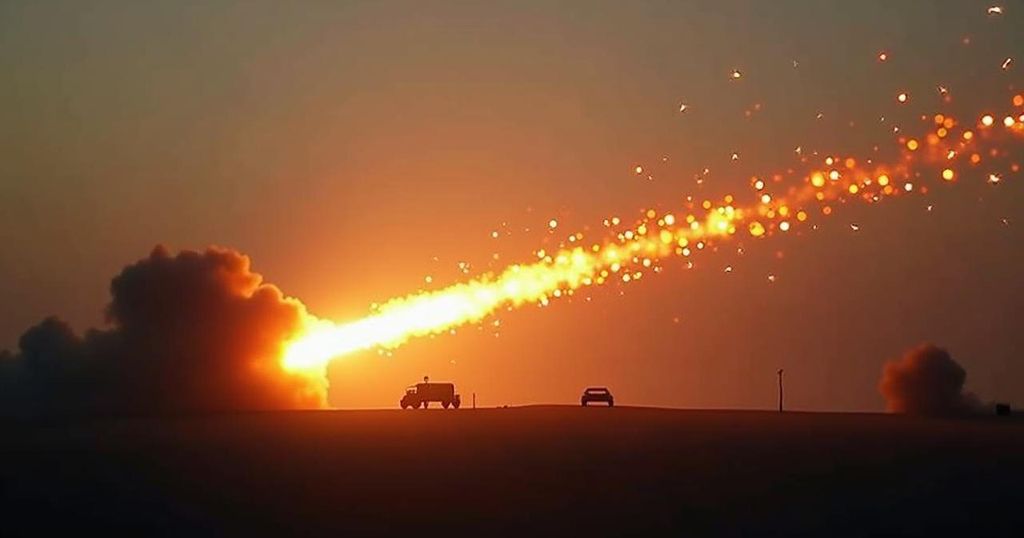Reports indicate that the Israeli military has claimed missile strikes from Iran targeting Israel, leading to a state of emergency in Israel with at least ten casualties. Lebanese Prime Minister Najib Mikati warns of a dangerous phase for Lebanon. Meanwhile, significant international figures are calling for military intervention to facilitate a two-state solution amidst escalating conflicts and military actions from both sides.
The situation in Israel and Lebanon has intensified amidst allegations of missile strikes, reportedly from Iran, targeting Israeli territory. The Israeli military has confirmed these missile firings but has yet to provide concrete details on their origins. Amidst this turmoil, flares and missiles are visible in the skies over Tel Aviv, prompting medical authorities to declare a state of emergency due to at least ten reported casualties from the subsequent violence, particularly in light of a noted shooting incident. Lebanese Prime Minister Najib Mikati has characterized this period as one of the most perilous stages in the country’s history. To address ongoing tensions, Danish Prime Minister Mette Frederiksen has called for an international military intervention aimed at implementing a two-state solution in the region. In remarks to the Danish news agency Ritzau, she underscored the need for a significant transformation in the international community’s approach toward the escalating conflict. “There is no solution in sight to what we see going on over there, and there is no point in letting things continue,” she asserted. The Israeli Defense Forces (IDF) reported that they have successfully targeted a key Hezbollah figure, Muhammad Jaafar Qasir, in Beirut. Citing his role in weapon transfers from Iran to Hezbollah, the IDF’s operations reflect a broader stance of security in response to perceived Iranian threats. Al Jazeera has been reporting on ground operations from Jordan, following its ban from Israel. As concerns mount, Daniel Hagari, spokesperson for the Israeli army, commented on the seriousness of the potential Iranian missile threats, advising citizens to adhere to guidance from the Home Front Command. Amid this environment, Menachem Klein from Bar-Ilan University’s Political Science Department noted the potential ramifications of recent military successes on public sentiment in Israel, suggesting a tempered euphoria, especially given the impending religious observance of Rosh Hashanah. In response to the escalating conflict, UN Secretary-General Antonio Guterres has expressed deep concern about the situation in Lebanon, advocating for an immediate ceasefire to avert a broader conflict. His office emphasized the importance of respecting Lebanon’s sovereignty and territorial integrity while mobilizing support for affected populations.
The geopolitical strife involving Israel, Lebanon, and Iran has reached a critical juncture, marked by potential missile strikes believed to be instigated by Iran against Israel. The dynamics of this conflict are exacerbated by ongoing military operations by the Israeli Defense Forces against Hezbollah, a group heavily backed by Iran. The situation has provoked responses not only from local authorities but also notable figures in the international community who advocate for changes in military and diplomatic strategies in the region. The interplay of these factors contributes to a fraught and unstable atmosphere, prompting urgent calls for intervention and ceasefire arrangements.
The recent developments demonstrate the precarious nature of security in Israel and the broader Middle East, particularly as tensions with Iran and Hezbollah mount. Allegations of missile launches, coupled with military offensives and significant local and international commentary, underscore the urgency for diplomatic intervention. Amid a state of emergency with rising casualties, the emphasis on a two-state solution and the call for an immediate ceasefire reflect the desperate need for stabilization in the region.
Original Source: www.aljazeera.com






